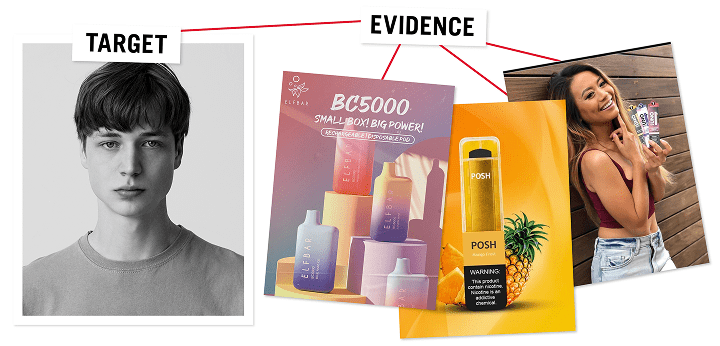
tobacco targets
Loopholes
“Tobacco scientists know that physiological satisfaction is almost totally related to nicotine intake.”
– Lorillard Tobacco Company official H.J. Minnemeyer, “Present Status of the Nicotine Enrichment Project,” April 13, 1977.
Big Tobacco knows its reputation is bad. That’s why they’ve changed their image — but not their strategy. Now they’re selling nicotine in new forms, hoping people won’t notice it’s the same addictive ingredients, just different products.
These new products don’t always contain tobacco, but that doesn’t mean they’re safe.

Same Addiction, New Packaging
To get around laws and public pushback, the tobacco industry now sells “nicotine-only” products. They falsely market them as clean, simple and harmless. Don’t be fooled, though. These products were made for one purpose: to keep people addicted.
Nicotine-only products include:
- Nicotine pouches
- Disposable vapes
- Nicotine toothpicks
- Lozenge-style products
They’re often flavored, easy to hide and designed to appeal to youth. Some are even promoted as tools to help people quit, even though they don’t meet medical standards for real cessation support.
What’s Really Inside
These products contain high levels of nicotine — sometimes even more than a cigarette. Nicotine levels this high can lead to:
- Increased heart rate and blood pressure
- Headaches, nausea and fatigue
- Tooth and gum damage
- Anxiety, mood swings and poor sleep
- Greater risk of long-term addiction
Nicotine also affects how the brain handles stress, focus and emotions. These mental health effects are especially harmful to young people whose brains are still developing.
Marketing Dangerous Lies
Big Tobacco doesn’t always show up by name anymore, but don’t be fooled — these products are made by the same dangerous companies.
They’ve spent millions to rebrand their products as modern and harmless to fool the public and continue targeting vulnerable communities like youth, communities of color and those already struggling with addiction.
Loopholes in the Law
For a while, some nicotine products weren’t regulated at all. That changed in 2022 when the U.S. Food and Drug Administration (FDA) began overseeing synthetic nicotine.¹ However, enforcement is still catching up, and companies continue to find new ways to sneak past the rules, including:
- Mislabeling products
- Changing ingredients slightly to dodge regulation
- Selling online with weak age checks
- Using social media influencers to reach teens